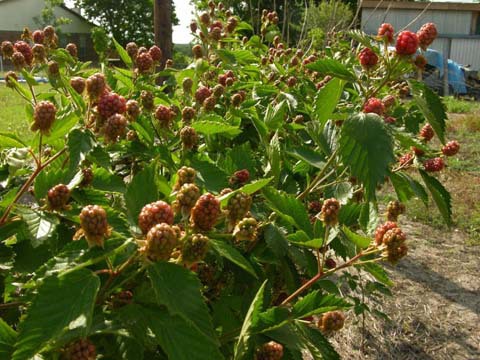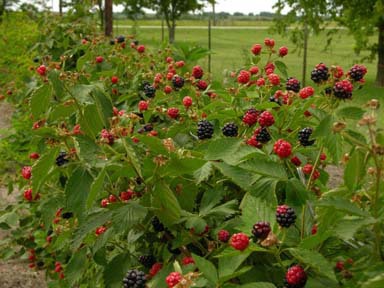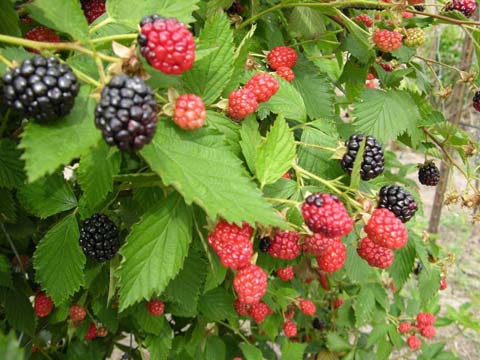
Thornless Blackberries:
For a number of years my oldest brother had a U-pick strawberry farm for FFA while he was in high school in Kentucky. He did very well with it, and he and my dad decided to continue the project while he was in college. The rest of us three kids were hired hands. We got 10 cents per row that we hoed. We had about five acres under cultivation. After lunch, for a reward of good behavior and getting up early to work all morning in the hot sun, my mother would take us to a lovely shallow area on the Eagle to play the afternoon away in cool river water.
I thought I knew all there was to know about raising strawberries, so the first spring after we moved to Hummingbird Hill I confidently ordered my strawberries and planted them about April. I fertilized, irrigated, and covered the paths with straw. The plants immediately began to die and continued to do so. By August I had one plant hanging on - barely. I was disgusted . Later, I found out that strawberries are considered an annual in Texas which you plant October thru November, harvest in May, and till them under in June. They just won't survive a Texas summer.
I have done much better with the thornless blackberries that I planted at the same time as I planted the strawberries. That was three years ago, and this year we are filling up the freezer with fat, juicy blackberries. Blackberries grow wild in KY with canes reaching twice a man high in thickets along the creek bottoms that you can easily get lost in. You wouldn't venture in there unless you had on snake boots, smeared on plenty of insect repellent for chiggers, and wore a long sleeve shirt and heavy jeans. Many people also cut the fingers out of gloves to protect their hands but could still pick the berries. This just goes to show you how much people like blackberries.
My Uncle Paul loved blackberry cobbler. He began to grow hybridized thornless blackberries years ago on his suburban back fence before most people even knew about them. The berries were huge! But the problem was that they were not very acidic, and tasted very bland, unless you added lemon juice to your pie. Well, now-a-days, thornless blackberries are much improved with tasty, zesty, blackberries that rival any of the wild kind. Every time I pick my blackberries along our neat row of thornless varieties I thank God, remembering the old wild wickedly thorny kind, where I would emerge with torn, bleeding fingers and covered with chigger bites. I actually like to run my fingers through the leaves of my blackberries reveling in their softness.
I planted four varieties supposed to do well in the South, and I accidentally ordered one that grew thorns! I immediately cut those down! Ugh! I've had enough of thorny blackberries! The other three thornless varieties were Ouachita, Triple Crown, and Apache. All of these have wonderful tasting fruit, and huge berries. The best one of the three is Ouachita. It is an early bloomer in April, and out-produced the other varieties five to one. Apache blooms a few weeks later than Ouachita. Triple Crown blooms a month later than the other two, and if a late frost gets the early varieties, it will most likely escape. Triple Crown has huge trailing canes and has to have support or else it will go everywhere. Apache is rather short, and you really don't need support for it. Ouachita needs support, but the canes are manageable.
Ouachita blackberries ripening at Hummingbird Hill
For a number of years my oldest brother had a U-pick strawberry farm for FFA while he was in high school in Kentucky. He did very well with it, and he and my dad decided to continue the project while he was in college. The rest of us three kids were hired hands. We got 10 cents per row that we hoed. We had about five acres under cultivation. After lunch, for a reward of good behavior and getting up early to work all morning in the hot sun, my mother would take us to a lovely shallow area on the Eagle to play the afternoon away in cool river water.
I thought I knew all there was to know about raising strawberries, so the first spring after we moved to Hummingbird Hill I confidently ordered my strawberries and planted them about April. I fertilized, irrigated, and covered the paths with straw. The plants immediately began to die and continued to do so. By August I had one plant hanging on - barely. I was disgusted . Later, I found out that strawberries are considered an annual in Texas which you plant October thru November, harvest in May, and till them under in June. They just won't survive a Texas summer.
I have done much better with the thornless blackberries that I planted at the same time as I planted the strawberries. That was three years ago, and this year we are filling up the freezer with fat, juicy blackberries. Blackberries grow wild in KY with canes reaching twice a man high in thickets along the creek bottoms that you can easily get lost in. You wouldn't venture in there unless you had on snake boots, smeared on plenty of insect repellent for chiggers, and wore a long sleeve shirt and heavy jeans. Many people also cut the fingers out of gloves to protect their hands but could still pick the berries. This just goes to show you how much people like blackberries.
My Uncle Paul loved blackberry cobbler. He began to grow hybridized thornless blackberries years ago on his suburban back fence before most people even knew about them. The berries were huge! But the problem was that they were not very acidic, and tasted very bland, unless you added lemon juice to your pie. Well, now-a-days, thornless blackberries are much improved with tasty, zesty, blackberries that rival any of the wild kind. Every time I pick my blackberries along our neat row of thornless varieties I thank God, remembering the old wild wickedly thorny kind, where I would emerge with torn, bleeding fingers and covered with chigger bites. I actually like to run my fingers through the leaves of my blackberries reveling in their softness.
I planted four varieties supposed to do well in the South, and I accidentally ordered one that grew thorns! I immediately cut those down! Ugh! I've had enough of thorny blackberries! The other three thornless varieties were Ouachita, Triple Crown, and Apache. All of these have wonderful tasting fruit, and huge berries. The best one of the three is Ouachita. It is an early bloomer in April, and out-produced the other varieties five to one. Apache blooms a few weeks later than Ouachita. Triple Crown blooms a month later than the other two, and if a late frost gets the early varieties, it will most likely escape. Triple Crown has huge trailing canes and has to have support or else it will go everywhere. Apache is rather short, and you really don't need support for it. Ouachita needs support, but the canes are manageable.
Ouachita blackberries ripening at Hummingbird Hill
Blackberries produce on two year old canes, after which they die, but the crown is busy making many more canes for you and you have to be diligent to keep them up off the ground, for they will root wherever the growing tips touch the ground. This will quickly make a thick blackberry patch that will be difficult to cultivate and pick from. But this also makes it easy to propagate them to fill in empty spots along your row. You can just poke the tips of a growing new cane into the dirt and step on it. In a few week it will grow roots. Then you can cut it off and plant it wherever you want. In the spring, cut out the old dead canes and dispose of them.
Blackberries are very drought hardy, but the key to large fruit is water. From first bloom until you pick the last berry make sure to water them when needed. Don't over fertilize them. A little each spring and fall is all they need as the roots are very shallow, and too much will easily burn them. Don't water with a sprinkler because this encourages disease; instead use a soaker hose or drip irrigation under a thick mulch. A black hose heats up a lot in the sun and you will be watering your plants with boiling hot water!
Blackberries get some diseases, but most of their problems are viruses for which there is no cure except to destroy the plants and replant in fresh dirt somewhere else. Order from a responsible nursery and keep an eye out for virus symptoms. If you find some with virus dispose of it quickly before it infects the other plants. Be sure to wash your tools in bleach that you used to cut out the diseased plants, for you can spread disease with infected tools. Wild blackberries canes are often hosts of viruses. The one disease that you might watch for is Can and Leaf Rust that responds to a fungicide. Lots of rain encourages disease, but that is usually not a problem here in Central Texas. The climate in Central Texas is actually quite suitable for growing blackberries. They are tolerant of many soil types. They like it best on the neutral side, but they are not really very picky. Using mulch over several years will help even out your soil pH, and help conserve water, especially if you have sandy loam.
Blackberry disease pictures and descriptions
Blackberries need aeration, adequate water during production, and good drainage. That's all there is too it except for maintaining your patch by pruning and propagating new canes, and tying up your rows. I don't know why more people don't grow them here in Central Texas. The huge clusters of fat, juicy blackberries the size of the first knuckle on your thumb are much easier to pick standing up, than going out and trying to pick thorny, wild dewberries trailing on the ground amongst all the poison ivy.
Blackberry row at Hummingbird Hill, June 2010
Blackberries are very drought hardy, but the key to large fruit is water. From first bloom until you pick the last berry make sure to water them when needed. Don't over fertilize them. A little each spring and fall is all they need as the roots are very shallow, and too much will easily burn them. Don't water with a sprinkler because this encourages disease; instead use a soaker hose or drip irrigation under a thick mulch. A black hose heats up a lot in the sun and you will be watering your plants with boiling hot water!
Blackberries get some diseases, but most of their problems are viruses for which there is no cure except to destroy the plants and replant in fresh dirt somewhere else. Order from a responsible nursery and keep an eye out for virus symptoms. If you find some with virus dispose of it quickly before it infects the other plants. Be sure to wash your tools in bleach that you used to cut out the diseased plants, for you can spread disease with infected tools. Wild blackberries canes are often hosts of viruses. The one disease that you might watch for is Can and Leaf Rust that responds to a fungicide. Lots of rain encourages disease, but that is usually not a problem here in Central Texas. The climate in Central Texas is actually quite suitable for growing blackberries. They are tolerant of many soil types. They like it best on the neutral side, but they are not really very picky. Using mulch over several years will help even out your soil pH, and help conserve water, especially if you have sandy loam.
Blackberry disease pictures and descriptions
Blackberries need aeration, adequate water during production, and good drainage. That's all there is too it except for maintaining your patch by pruning and propagating new canes, and tying up your rows. I don't know why more people don't grow them here in Central Texas. The huge clusters of fat, juicy blackberries the size of the first knuckle on your thumb are much easier to pick standing up, than going out and trying to pick thorny, wild dewberries trailing on the ground amongst all the poison ivy.
Blackberry row at Hummingbird Hill, June 2010


